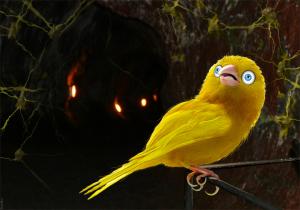
Mining is dangerous work. The more miners dug into the earth, the more likely they were to be exposed to dangerous gasses, like carbon monoxide. As such gasses collected in the mine, the miners died. Mining companies decided to do something about it. They decided to follow a test which was made to see if the mine was safe. They would put down a caged canary into the mine, and if it died, the company knew that was a sign that the mine was not safe for the miners. Thankfully, the practice has ended, but the idea behind it, that we should look to warning signs around us that seem to indicate potential danger for us, is valid. Such signs, when they are seen in relation to some environmental concern, are considered to be “canaries in a coal mine.”
Environmentally, we have several instances where we see particularly plant and animal species, important for the protection of the biosphere, becoming endangered, if not actually extinct. Each one of them can be said to be an environmental “canary in a coal mine.” Each one of them should warn us that we have not been good stewards of the Earth, and we are facing a dire extinction level event for humanity if we do not deal with the situation which we have created. [1]
For example, our water supplies are at risk. Water is important for life. One of the ways water is kept clean is through the creatures which live in it, such as mussels. “Mussels clean the water by sucking up pollutants, and they’re an important food source for fish, birds, and other animals.”[2] Sadly, such mussels are dying out, and scientists are not exactly sure why. “70 percent of native freshwater mussels in the United States are in danger of extinction.” [3] Scientists are doing more than observing the problem, they are trying to do something about it; we find efforts to help them, to make sure they do not become extinct, but because we do not know what has caused the problem, it is also difficult to know if their efforts will be successful for an extended period of time. Nonetheless many signs indicate, even if climate change is not the only problem, it is one of the problems which is causing them to perish, and their destruction, if it is not halted, will only hasten the destruction of the biosphere and the harm which is possible because of climate change.
We should see the destruction that pollution and climate change is doing to insect life around the world as another canary in the coal mine. The fate of the Mitchell satyr butterfly is seen as an indication of the destruction of natural habitats being done by the careless disregard for the environment by humanity. Bees play an important part of pollenization for plants; when we see species of them becoming endangered, that should be a great warning sign that not all is well for the environment. We do not need to talk about climate change to see the harm humanity has caused to the environment, but all those problems become far more exasperated with climate change. The speed of the change continues to increase, and as it does so, adaptation to fit with the change because difficult, if not impossible, making more and more species die out. It should not be needed to be said, but alas, it does: every species which becomes extinct as a result of human mismanagement of the Earth, the more the biosphere will feel the effects of the change, and the more likely humanity will be the orchestrator of its own demise. Those who know the serious consequences which follow when biodiversity falters are trying to create safe habitats for those species, but they will not be able to do enough if the environment itself is not protected, and climate change is not halted.
How many species need to die out, how many canaries in a coal mine do we need, to take the environment, and climate change, seriously? The world is dying around us. We are a part of the world. We will feel the effects of that death which we have unleashed if we do not do our part to heal the Earth and fix the problems which we have created. Pope Francis understands this; he knows what will happen if climate change continues:
If present trends continue, this century may well witness extraordinary climate change and an unprecedented destruction of ecosystems, with serious consequences for all of us. A rise in the sea level, for example, can create extremely serious situations, if we consider that a quarter of the world’s population lives on the coast or nearby, and that the majority of our megacities are situated in coastal areas. [4]
We have already seen the destruction of life around us, but what we notice is of a particular kind of life, a more noticeable kind of life, while other forms, which are not so easily seen, are likewise suffering, and their destruction is every bit as important, if not more important, than those which we normally perceive:
It may well disturb us to learn of the extinction of mammals or birds, since they are more visible. But the good functioning of ecosystems also requires fungi, algae, worms, insects, reptiles and an innumerable variety of microorganisms. Some less numerous species, although generally unseen, nonetheless play a critical role in maintaining the equilibrium of a particular place. Human beings must intervene when a geosystem reaches a critical state. [5]
Humanity has violated its obligations to the Earth. It is a moral issue, and so one which Christians cannot ignore, as St. John Paul II explained:
Once again it is evident that development, the planning which governs it, and the way in which resources are used must include respect for moral demands. One of the latter undoubtedly imposes limits on the use of the natural world. The dominion granted to man by the Creator is not an absolute power, nor can one speak of a freedom to “use and misuse,” or to dispose of things as one pleases. The limitation imposed from the beginning by the Creator himself and expressed symbolically by the prohibition not to “eat of the fruit of the tree” (cf. Gen 2:16-17) shows clearly enough that, when it comes to the natural world, we are subject not only to biological laws but also to moral ones, which cannot be violated with impunity.[6]
Environmentalism cannot be neglected. It is a moral concern. The fate of humanity, the fate of the world at large, is at risk. We cannot shrug our responsibility and remain unconcerned for the countless deaths which are the result of our own neglect. Failing to do what is obligatory is a sin.
The more we try to excuse ourselves from our moral obligation to take care of the Earth, the more we will suffer the consequences of our inaction. The more we see various forms of life in the world die out because we have neglected our role as stewards of the Earth, the more we set the stage for our own death in the future. If we say we care about babies, but do nothing to make sure they can survive in the future, we lie. It is a Satanic kind of deception which tries to pit fetuses against care for the Earth. Truly, those who claim to be concerned about life and do nothing to protect and preserve what is necessary for life in the future show they are only concerned about themselves. How many will use babies as human shields for their selfishness and greed before people realize that those very babies are not being saved by those who use them in such a manner?
It is possible to say that each distinct species of plant, animal, or fungus, which finds itself endangered or extinct in the modern world because of what humanity has done to the planet is a canary in the coal mine. Each one of them is a warning that human activity has become immorally destructive. There are two ways forward. One is the way of life, the other is the way of death and destruction.
Christianity is a religion which promotes life. Christianity tells us to take care of the Earth and be concerned with every canary coal mine which comes before them regarding the environment. Certainly, it is not just Christians who are concerned about the future of the Earth. All those of good will are concerned. They know the seriousness of the issue. Why, then, do so many Christians shrug their arms do nothing? Why do so many of us choose the path of death? Is it because they do not really hear the voice of Jesus, but rather, they hear the voices in their head approving their sins? Alas, it certainly seems that way.
[1] There are also environmental “canaries in the coal mine” as well, such as the continued rise in global temperatures every year, as well as the destruction of many long-standing glaciers throughout the world.
[2] Christopher Collins, “The Fate Of Freshwater Mussels: A Harbinger Of Climate Change To Come” in Texas Standard (11-25-2019).
[3] Christopher Collins, “The Fate Of Freshwater Mussels: A Harbinger Of Climate Change To Come.”
[4] Pope Francis, Laudato si’. Vatican Translation. ¶24.
[5] Pope Francis, Laudato si’,¶34.
[6] St. John Paul II, Sollicitudo Rei Socialis. Vatican translation. ¶33.
Stay in touch! Like A Little Bit of Nothing on Facebook.
If you liked what you read, please consider sharing it with your friends and family!













